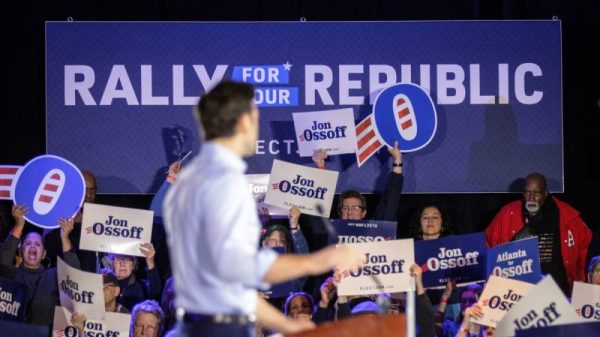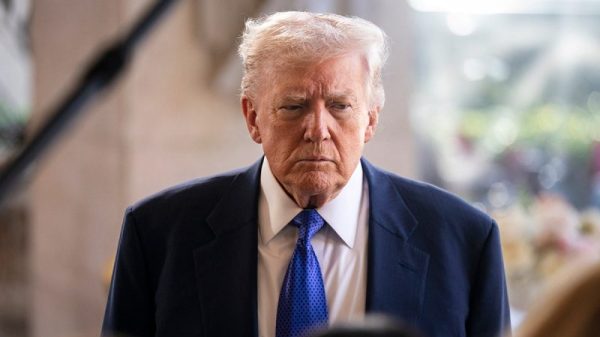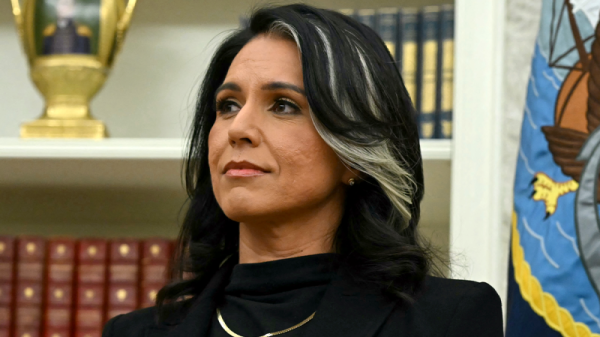One month before a deadline that could turn contentious automotive contract talks into strikes, President Biden urged Detroit’s Big Three car companies and the United Auto Workers to forge a deal.
Automakers should “take every possible step” to avoid closing plants and keep jobs in their existing manufacturing communities when they need to retool, Biden said in a statement. They should also pay wages that can support a family and honor workers’ right to organize, he added.
The president also suggested a word of caution for the UAW as it puts big wage-increase demands on the table, saying that the U.S. auto industry needs to “successfully compete domestically and globally.”
Biden framed his statement as particularly vital amid a broad industry retooling to produce electric vehicles.
“The middle class built America, and unions built the middle class,” he said. “The need to transition to a clean energy economy should provide a win‑win opportunity for auto companies and unionized workers.”
Biden’s intervention comes as the UAW’s new leadership leads an aggressive campaign for better wages and benefits, with one month to go before its existing contract expires Sept. 14. The union has all but said it will strike if talks don’t progress by then.
The automotive sector is vital to U.S. manufacturing, making up about 3 percent of gross domestic product. The UAW’s 150,000 automotive members produce nearly half of the light vehicles manufactured in the United States, according to GlobalData.
With positive indicators helping buoy economists’ and consumers’ attitudes about the economy, the administration is keen to avoid a strike that could cripple such a vital part of the manufacturing sector.
Biden’s statement also comes after the UAW took the unusual step of withholding its endorsement for the president’s reelection, saying in May that it wants to see strong support from the administration before it commits to an endorsement. The move marked a rare moment of discord between a president and a labor movement that have long seen each other as allies.
“As the Big Three auto companies and the United Auto Workers come together — one month before the expiration of their contract — to negotiate a new agreement, I want to be clear about where I stand. I’m asking all sides to work together to forge a fair agreement,” Biden said Monday.
The UAW’s newly elected president, Shawn Fain, has amped up the union’s demands after what he calls too many years of complacency and concessions by union leadership. Automakers have suggested they can’t remain competitive against Tesla and other non-unionized workplaces if they grant what the union is demanding.
In a statement, Fain said the union appreciates Biden’s “support for strong contracts that ensure good paying union jobs now and pave the way for a just transition to an EV future.”
Stellantis, the parent company of Chrysler, Jeep, Dodge and other brands, said it is aiming for a deal that “balances the concerns of our 43,000 employees with our vision for the future — one that better positions the business to meet the challenges of the U.S. marketplace and secures the future for all of our employees, their families and our company.”
General Motors said it’s seeking a “fair labor contract” that “provides job security and supports good wages and benefits for our team members while enabling companies to compete successfully domestically and globally.”
Ford didn’t immediately provide comment.
One month before a deadline that could turn contentious automotive contract talks into strikes, President Biden urged Detroit’s Big Three car companies and the United Auto Workers to forge a deal.
Automakers should “take every possible step” to avoid closing plants and keep jobs in their existing manufacturing communities when they need to retool, Biden said in a statement. They should also pay wages that can support a family and honor workers’ right to organize, he added.
The president also suggested a word of caution for the UAW as it puts big wage-increase demands on the table, saying that the U.S. auto industry needs to “successfully compete domestically and globally.”
Biden framed his statement as particularly vital amid a broad industry retooling to produce electric vehicles.
“The middle class built America, and unions built the middle class,” he said. “The need to transition to a clean energy economy should provide a win‑win opportunity for auto companies and unionized workers.”
Biden’s intervention comes as the UAW’s new leadership leads an aggressive campaign for better wages and benefits, with one month to go before its existing contract expires Sept. 14. The union has all but said it will strike if talks don’t progress by then.
The automotive sector is vital to U.S. manufacturing, making up about 3 percent of gross domestic product. The UAW’s 150,000 automotive members produce nearly half of the light vehicles manufactured in the United States, according to GlobalData.
With positive indicators helping buoy economists’ and consumers’ attitudes about the economy, the administration is keen to avoid a strike that could cripple such a vital part of the manufacturing sector.
Biden’s statement also comes after the UAW took the unusual step of withholding its endorsement for the president’s reelection, saying in May that it wants to see strong support from the administration before it commits to an endorsement. The move marked a rare moment of discord between a president and a labor movement that have long seen each other as allies.
“As the Big Three auto companies and the United Auto Workers come together — one month before the expiration of their contract — to negotiate a new agreement, I want to be clear about where I stand. I’m asking all sides to work together to forge a fair agreement,” Biden said Monday.
The UAW’s newly elected president, Shawn Fain, has amped up the union’s demands after what he calls too many years of complacency and concessions by union leadership. Automakers have suggested they can’t remain competitive against Tesla and other non-unionized workplaces if they grant what the union is demanding.
In a statement, Fain said the union appreciates Biden’s “support for strong contracts that ensure good paying union jobs now and pave the way for a just transition to an EV future.”
Stellantis, the parent company of Chrysler, Jeep, Dodge and other brands, said it is aiming for a deal that “balances the concerns of our 43,000 employees with our vision for the future — one that better positions the business to meet the challenges of the U.S. marketplace and secures the future for all of our employees, their families and our company.”
General Motors said it’s seeking a “fair labor contract” that “provides job security and supports good wages and benefits for our team members while enabling companies to compete successfully domestically and globally.”
Ford didn’t immediately provide comment.





















